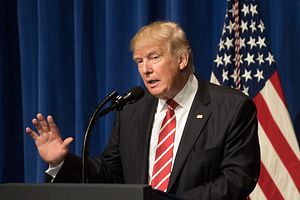Donald Trump is coming to East Asia, which is likely to spark mixed feeling among U.S. allies in the region. Many of his policies are hostile to U.S. allies’ interests: the termination of the Trans-Pacific Partnership, his loathing for the KORUS free-trade agreement, his attacks on NAFTA (in which many Asian exporters have a stake), his Iran policy, and his unprofessional theatrics on North Korea, to name just a few. Less obviously, gutting the State Department hurts pro-U.S. nations who want a potent American diplomatic apparatus. The “born in the USA” global system that Trump despises is also the public good that upholds the wellbeing of U.S. partners (and some rivals as well). And there is no telling on how Trump’s cultivation of white Christian prejudice could damage ties between the United States and Asian partners whose peoples are overwhelmingly neither white nor Christian.
More broadly, as the Corinthians told the Spartans during the Peloponnesian War, the duty and self-interest of a senior ally is to take into account the junior partners. With some unfortunate lapses, this is what Washington has accomplished since Lend-Lease during World War II. Trump’s “America First” mindset, however, postulates that no one else matters. It forgets that America’s central role, though requiring an above-average effort, sustains outcomes which are excellent for the United States itself. “America First” is the polar opposite of what is logical for an economic, military, and ideological universal superpower.
Fortunately, Trump has not yet fully upended traditional U.S. policy. TPP was already in intensive care — partly due to Clinton’s failure to defend it in the face of protectionism from her rival for the Democratic presidential nomination, Bernie Sanders. KORUS and NAFTA have not (yet) been abrogated. U.S. forces are still overseas, and wars of choice haven’t been started. Mismanagement, the opposition of some senior officials and Congress, and a Constitution designed to constrain human impulses have partially blunted the impact of Trumpism.
Nevertheless, Trump is president. Some may hope he is a temporary aberration, but, as Guideon Rachman wrote in the Financial Times, he’s probably “more than a blip in history.”
Governments must plan for the worse. Hoping that the caretakers of what Senator Bob Corker, a fellow Republican, called the “adult day care center” at the White House will prevent a derailment for the next three (or seven in case of reelection) years is irresponsible. Praying for the second coming of a George H.W. Bush-style presidency, with a patriotic chief executive devoted to maintaining and upgrading the system with the backing of Congress, would be a dereliction of duty.
What can American allies do if Trumpism becomes the dominant American creed? Or if it is replaced by a left-wing version which, though devoid of xenophobia and racism, will be hostile to the large forward deployment of American armed might and economic globalization?
In the purely military sphere, the only contingency plan for allies is to build far stronger forces, along the lines of what Singapore has done for decades.
Moreover, allies will have to develop alliance mechanisms to enhance regional and global security in a Trumpian environment. A much stronger security framework between the European EU/NATO states, Canada, Australia, New Zealand, the East Asian allies, some Southeast Asian countries, and other nations such as India will be required.
Another other pillar has to be massive financial and political support for the international institutions, namely the UN and its agencies, the IMF, the World Bank and of course the WTO, which do far more to support than hinder the objectives of the United States and its allies and partners. Thus the allies have to be willing to plug the financial and diplomatic gaps resulting from “America First” to sustain these organizations.
But regardless of what others can achieve to compensate for Washington’s follies, a world without the United States would certainly leave the allies worse off. They should consequently try to turn the United States away from Trumpism. One avenue is to influence the U.S. political process. After World War II, American overt and covert actions promoted pro-U.S. democratic conservatives and social-democrats in Asia and Europe (and, at times, dictators who sided with the West). Foreign political parties, including the LDP, benefited from the CIA’s generosity in the old days. But today bags of cash would probably yield little and run the risk of a backlash. An active and effective public diplomacy could help, though it alone will not be sufficient.
The allies should thus also address some of the root causes of Trump’s success. Bigotry helped make Trump president, but economic discontent also contributed to his victory, as well as to Clinton’s mauling by an obscure self-described socialist senator with a very thin résumé during the Democratic primaries. The allies could initiate a Marshall Plan for the United States, funding infrastructure, health programs, and other initiatives. Without devoting more than 1 percent of GDP to it, the Asian allies could put in $80 billion a year into the U.S. economy, possibly focusing on individual states rather than on the country as a whole. If they enlisted the NATO members, it could easily reach $200 billion annually. The Marshall Plan dealt not only with the physical ravages of war, but also with the political ones due to fascism and the threat of communism. In this case, the allies would be investing in the renewal, for the better, of American politics.
The task ahead is Herculean. Strengthening militaries, building alliances, and steering the U.S. back to the right path demands the sort of vision that Franklin Roosevelt, Harry Truman, George Marshall, and their immediate successors displayed. Success is not certain. The cost of doing nothing and waiting for Trump to disappear is much higher.
Robert Dujarric is Director, Institute of Contemporary Asian Studies, Temple University Japan.
































